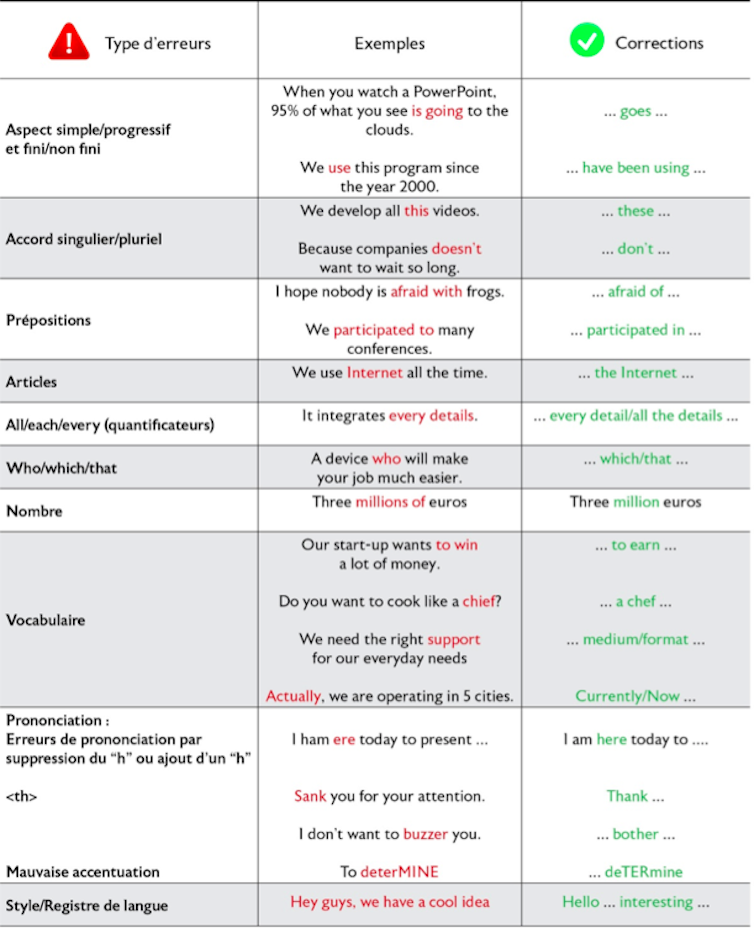French entrepreneurs: succeed (at last) with your English pitches!
Peter Daly, Associate Professor, EDHEC Business School and Dennis Davy, Associate professor, EDHEC Business School, highlights the role of pitches for Entrepreneurs in an article originally published in French in The Conversation.
Mastering the two-minute entrepreneurial pitch is a key skill required of entrepreneurs and anyone else who needs to sell a concept or product in a professional context.
Not an easy exercise, especially when English is not your mother tongue and you want to present a convincing and successful pitch...
As part of a linguistic research project, we recorded 20 two-minute pitches in English by French entrepreneurs. After transcribing and anonymizing them, we identified a variety of different errors. We then categorized them using frameworks developed by experts in the field of error analysis, such as Jack Richards, Pit Corder and Julian Edge.
More serious mistakes than others
Some of the errors in our corpus were obviously just production errors or careless mistakes, due to stress and nervousness, but others were systematic and corresponded closely to those identified by linguists such as Swan & Smith (1987) in their « Learner English » study. English, as produced by French entrepreneurs, can be analyzed in terms of "minor" errors (e.g. prepositions, verb tenses and aspect, articles, quantifiers and numbers) and "major" errors (e.g. vocabulary, grammar, pronunciation and style).

Adapting a protocol borrowed from the field of error severity perception (Khalil, 1995 ; Jenkins, 2009) and linked to concepts such as intelligibility, acceptability and irritation factor, we chose three types of "judges" (native English teachers, native French-speaking English teachers and non-teaching English-speaking managers) and asked them to what extent they considered the various types of error to be important or not.
All the judges identified pronunciation as the most frequent source of errors. They also noted many specific cases of errors in prepositions, numbers, vocabulary and tenses. Native French-speaking English teachers identified the highest number of errors and managers the lowest, also using less specific terms than language professionals to describe the errors. While teachers noted many incorrect uses of tenses, incorrect singular and plural agreements and 3rd person endings, managers emphasized clarity, pronunciation and diction.
More or less lenient interlocutors
On the whole, all judges were relatively lenient on errors relating to the pronunciation of th and h, but harsher when it came to incorrect word stress and flow, excessive use of "speech tics" such as eh and um, and mispronunciation of important proper nouns.
For language teachers, by far the most frequently chosen adjective to describe errors was "frustrating", but "careless" and "disturbing" were also common. The word "unpleasant" was used ten times more often by native French-speaking teachers than by their English-speaking counterparts. The adjectives most frequently used by managers were "annoying" and "unpleasant", with a few instances of "frustrating" and "exasperating". All judges occasionally described mistakes as "funny" or "amusing".

Our small-scale study confirms the wide variation in the way interlocutors identify errors and subjectively judge whether they are major or minor. It also corroborates previous research that "non-native" teachers are generally more severe in their judgment than "native" teachers. Finally, it confirms that native-speaker teachers and professionals tend to focus more on meaning than on form.
That's why we've come up with a series of tips to help you get the most out of your pitch in English:
- Rehearse your pitch carefully
- Speak slowly and clearly, paying particular attention to proper nouns.
- Make sure your message is easy to understand
- Try to avoid pronunciation, vocabulary and grammar errors.
- Avoid excessive use of hesitation markers, which are known to annoy the different types of people who will be evaluating your pitch.
This article is republished from The Conversation under Creative Commons license. Read the original article.
Picture on freepik




